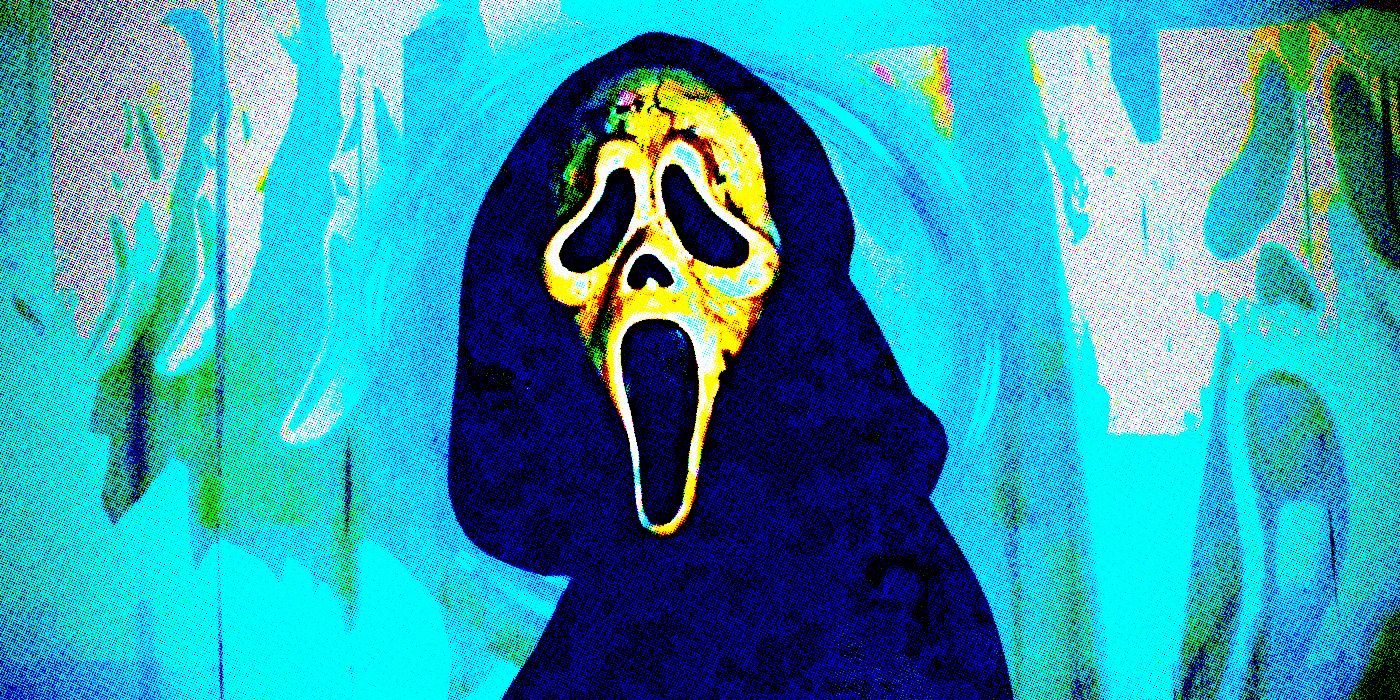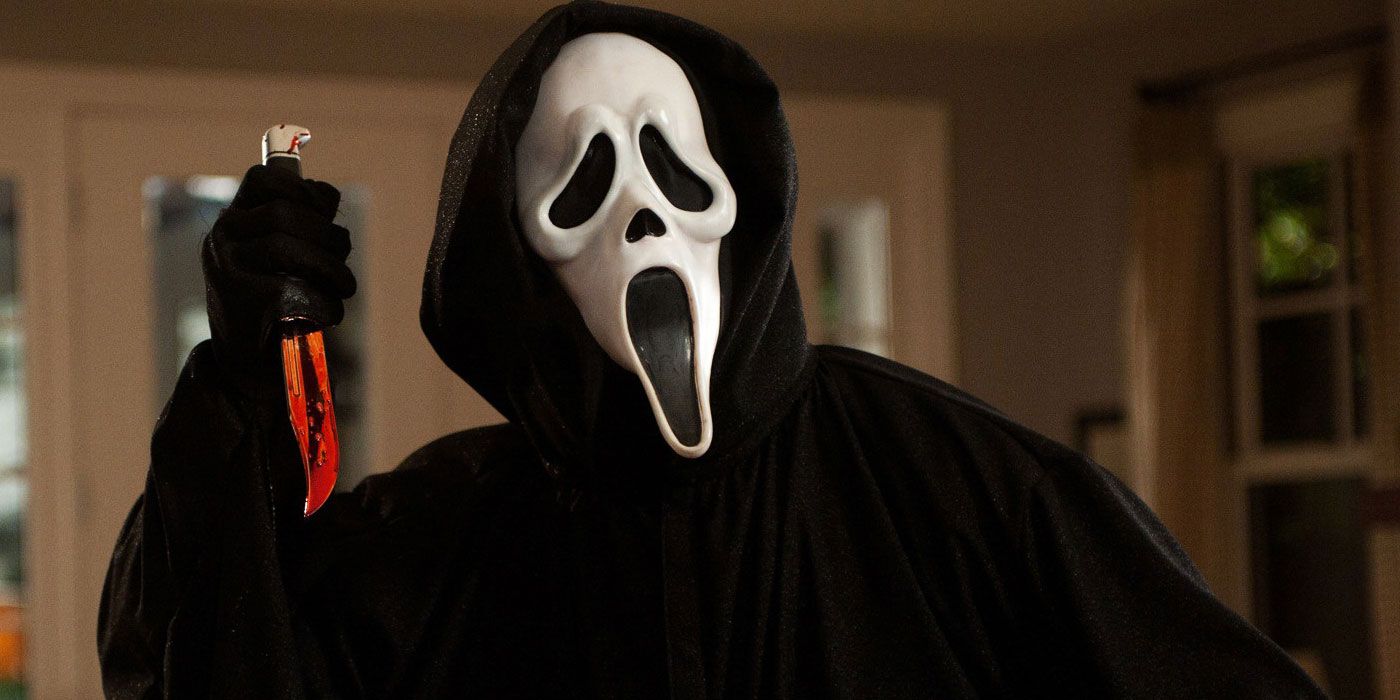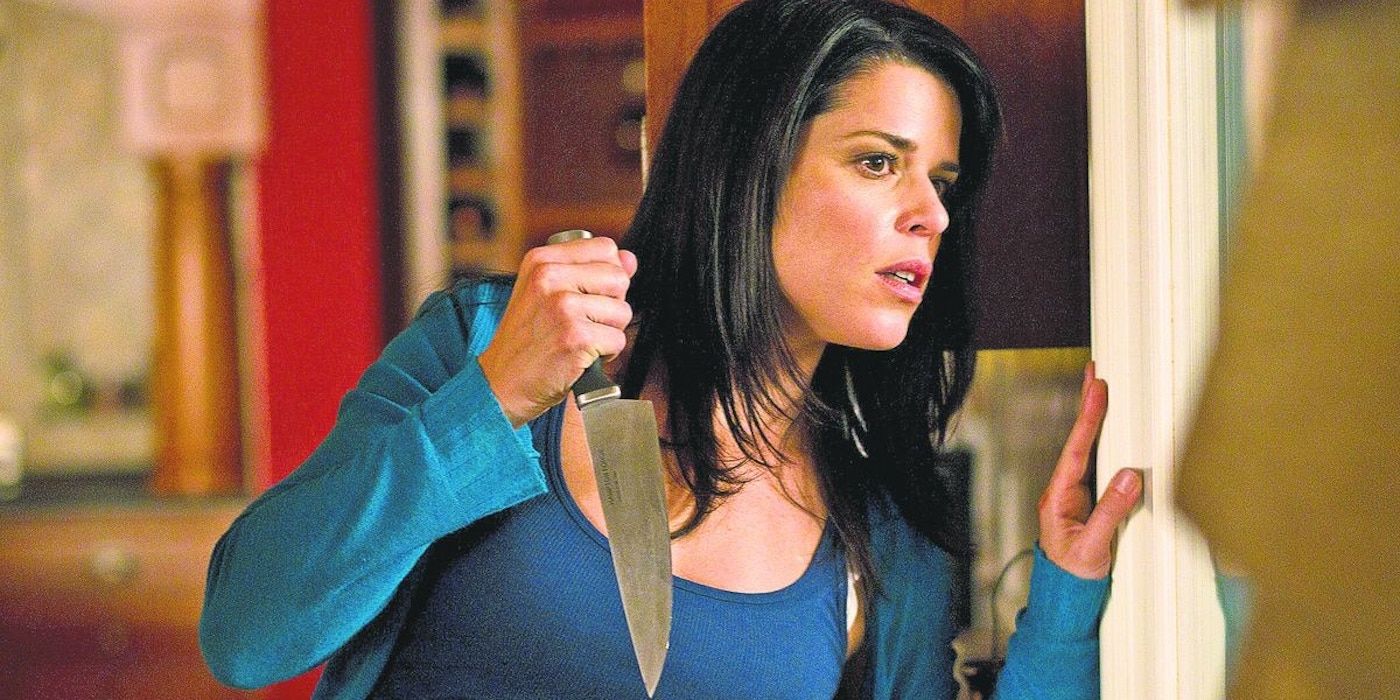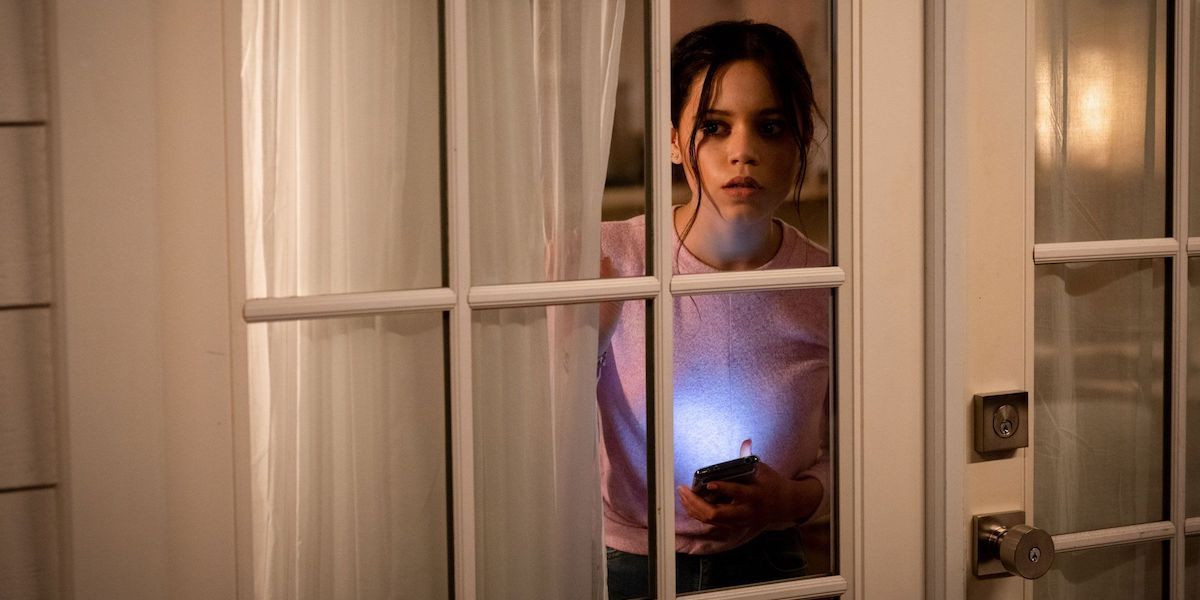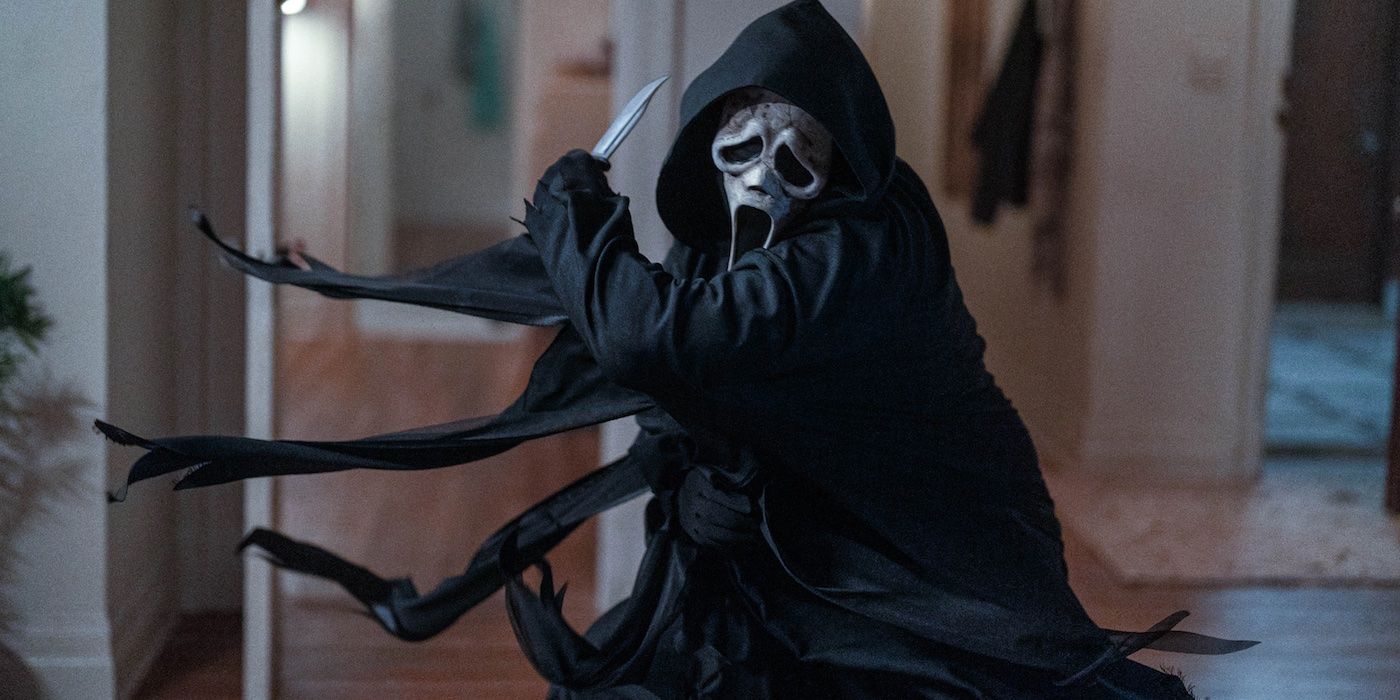If there's one thing that never changes about the horror genre, despite its ups and downs, it's that its franchises never die. In just the last few years we've seen sequels and spinoffs for the likes of Halloween, The Texas Chainsaw Massacre, Child's Play, Hellraiser, The Conjuring, and Predator, just to name a few. While some of these new additions have been surprisingly impressive (we're looking at you David Bruckner's Hellraiser and Predator prequel Prey), no franchise, not even inactive ones like Friday the 13th or A Nightmare on Elm Street, can match what Scream has done. Throughout six films, the franchise, founded in the collective genius of Wes Craven and Kevin Williamson, shows no signs of slowing down in not only its popularity, but its creativity. That desire to keep giving fans what they want, but in new and inventive ways, without being a simple nostalgic cash grab, makes Scream the best horror franchise of all-time.
No one could have predicted how much Scream would change the horror world back in 1996. In the mid 1990s, slasher films were as dead as Michael Myers at the end of Halloween Ends. It went beyond that subgenre though. The entire horror genre was struggling to make any impact. Wes Craven himself discovered this two years before Scream when he tried to resurrect his then greatest creation, Freddy Krueger, with 1994's New Nightmare. The clever, meta take on horror (a foreshadowing of what was to come a few dozen months later) was a fun take on a spent franchise, but while critics enjoyed it, audiences didn't turn out. New Nightmare performed worse than any film in the franchise at the box office, banking only $18 million domestically. If Wes Craven, one of horror's most respected directors, couldn't make a horror hit, who could?
'Scream' Saved the Horror Genre
It turned out that Craven was the answer, but that he needed a new idea. Audiences didn't suddenly hate horror movies, they had simply grown bored with seeing the same old thing done over and over again. Horror needed a new spin. Enter Scream. Kevin Williamson's fresh take on a sputtering genre dissected slasher films, exposing their ridiculous tropes, while also respecting them, resulting in a screenplay that was a love letter to horror while also building it back up from its ruins. Everything about that first film worked perfectly. It had the expected tropes of virginal final girls, victims making dumb mistakes, and a masked killer who could seemingly be everywhere at once, but it wasn't more of the same old formula that had turned moviegoers away. Instead, that formula was used for a meta wink at the audience. It told us, we know you're sick of this crap, but watch this! Then Scream would turn the old formula on its head, creating a film that was both funny and frightening, but also refreshingly smart.
To top it off, Scream nailed it with its phenomenal ending. With so many other franchises, you know what's going to happen going in. Michael Myers or Jason Voorhees are going to kill some teenagers, a girl is going to fight back and kill them, but before the credits roll, the killer will rise again to get ready for the next sequel. Not Scream. Ghostface was scary, but we had no idea who was behind the mask, which made him even that much more terrifying. It made Scream a fascinating whodunit. Even a non-horror fan could watch the movie and enjoy it for its mystery.
When Scream ended with its killers revealed and very much dead (though the Stu comeback rumors will never die), it could have stopped there, but something big happened. Not only did critics have great things to say about the film, but audiences showed up in droves to the cinema to watch it, with it bringing in $103 million just in the United States alone. Horror was suddenly hot again. Scream had single-handedly saved the horror genre. No other franchise can claim to have done anything close to that.
The 'Scream' Sequels Aimed to Do More Than Recreate the Past
The Scream wannabees came fast and quick, most notably with Kevin Williamson's own I Know What You Did Last Summer. No film could recapture what Scream did, however. With the immense financial success, a sequel was obvious. It could have been a disaster. When the likes of Michael Myers, Jason Voorhees, and Freddy Krueger took off, they quickly became lazy. Producers just wanted to repeat previous success and recapture the amount of dollars made before. That wasn't Scream. The fact that a sequel would require a different Ghostface already promised fans that this wouldn't your same old slasher sequel. The writers were going to have to work to produce something clever. Scream 2, created again by Williamson and Craven, was as big and great as the first film. It shouldn't have been a surprise. The Scream universe, with its meta storytelling, was perfect for the sequel and franchise treatment. If the first film was a nod to past horror films, then they almost had to do it. The formula had to carry on. Scream did it beautifully, taking shots at sequels, trilogies, and requels (sequels that are a soft reboot) as the franchise moved along from Scream 2, Scream 3, and Scream 4.
Not every film was great. Scream 3 is considered the worst of the bunch for multiple reasons. But the consistency in quality didn't drop off to a huge degree, such as the fall between something like Halloween and Halloween: The Curse of Michael Myers. That's because the franchise still respected not just its fans but itself. Scream 3's killer reveal, for example, might have been a disappointment, but at least the killer wasn't a zombie hulk or a supernatural man possessed by a cult. Also, we had the fun of the reveal itself. Even if the killer was letdown when the mask came off, the mystery of trying to figure it out was still a great time.
And when a plot didn't click, such as in Scream 3, we still had the same fun legacy characters led by Neve Campbell, Courteney Cox, and David Arquette. The killer thankfully changed every time, but we had a great trio of characters with amazing chemistry. Over the years, they had become our friends, but they also grew and changed. Sidney (Campbell) grows up and becomes a woman, Gale (Cox) grows more of a heart, Dewey (Arquette) becomes a Sheriff, and Gale and Dewey come together, get married, and divorce. We weren't watching the same characters in the same story each time.
The 'Scream' Franchise Confronted the Challenge of Wes Craven's Passing
That doesn't mean that the Scream franchise hasn't had its challenges. After the original trilogy ended in 2000, it sat dormant for eleven years, until 2011, when Craven and Williamson brought it back for Scream 4. The film itself worked, being just as fun and smart as the others, but horror had also changed in that decade away. Scream 4 was a dud at the box office, only taking in $38 million on a $40 million budget. The plan was to start a new trilogy, but the film's financial failures sent the franchise back to the darkness.
The franchise saw its biggest challenge last year for the fifth film, simply titled Scream. For the first time ever, Wes Craven, who had passed away in 2015, wouldn't be behind the camera. It became the responsibility of the men known as Radio Silence to carry the weight of a legendary director and franchise. The film could have fallen flat on its face. By 2022, nostalgic horror reboots were all the rage, especially with Jamie Lee Curtis returning to the Halloween franchise for a new trilogy. After a great first film, the movies didn't know where to go with its Scream Queen, or what story to tell. For example, Curtis spends all of Halloween Kills in a hospital bed. There seemed to be no direction.
The New 'Scream' Films Aren't Simply Made For Nostalgia
Scream wasn't lazy. They could have just caved in to nostalgia, especially with Neve Campbell, Courteney Cox, and David Arquette all being back. Instead, they went for it, challenging themselves and audiences by creating a film that fed into our past loves while also pushing it forward for a new generation of fans who didn't want a horror movie to just do what had been done so many times before. Audiences now are harder to please. It takes a lot to impress those who have so many options for entertainment in front of them.
The fifth Scream and this year's Scream VI continued the fun mystery while also ramping up the kills and gore, but without forgetting to be a smart film that looks at how horror and its formulas have changed over the last few decades. The Scream films are a window into our pop culture zeitgeist. They are important in a way no other horror franchise is because of that. But that window is not one that wishes to stay closed and rooted in the past. It instead takes a risk by slowly letting go of its past legacy to create new characters for us to love like Melissa Barrera's Sam and Jenna Ortega's Tara. It worked so well, that now, in a franchise without Craven, Williamson, Arquette, and Campbell — who exited the franchise after 2022 Scream — and a barely used Courteney Cox, we barely notice because the films have done such a brilliant job of keeping the Ghostface spirit alive and letting it grow beyond nostalgic glory.
There's little doubt that there will be a Scream 7 and probably more after that. Until they decide to take Ghostface to space though, we'll keep coming back, because the franchise continues to give us the familiar in the most unexpected of ways. Who are we kidding? Even Ghostface in space would be interesting to see.
Scream VI is currently playing in theaters.

